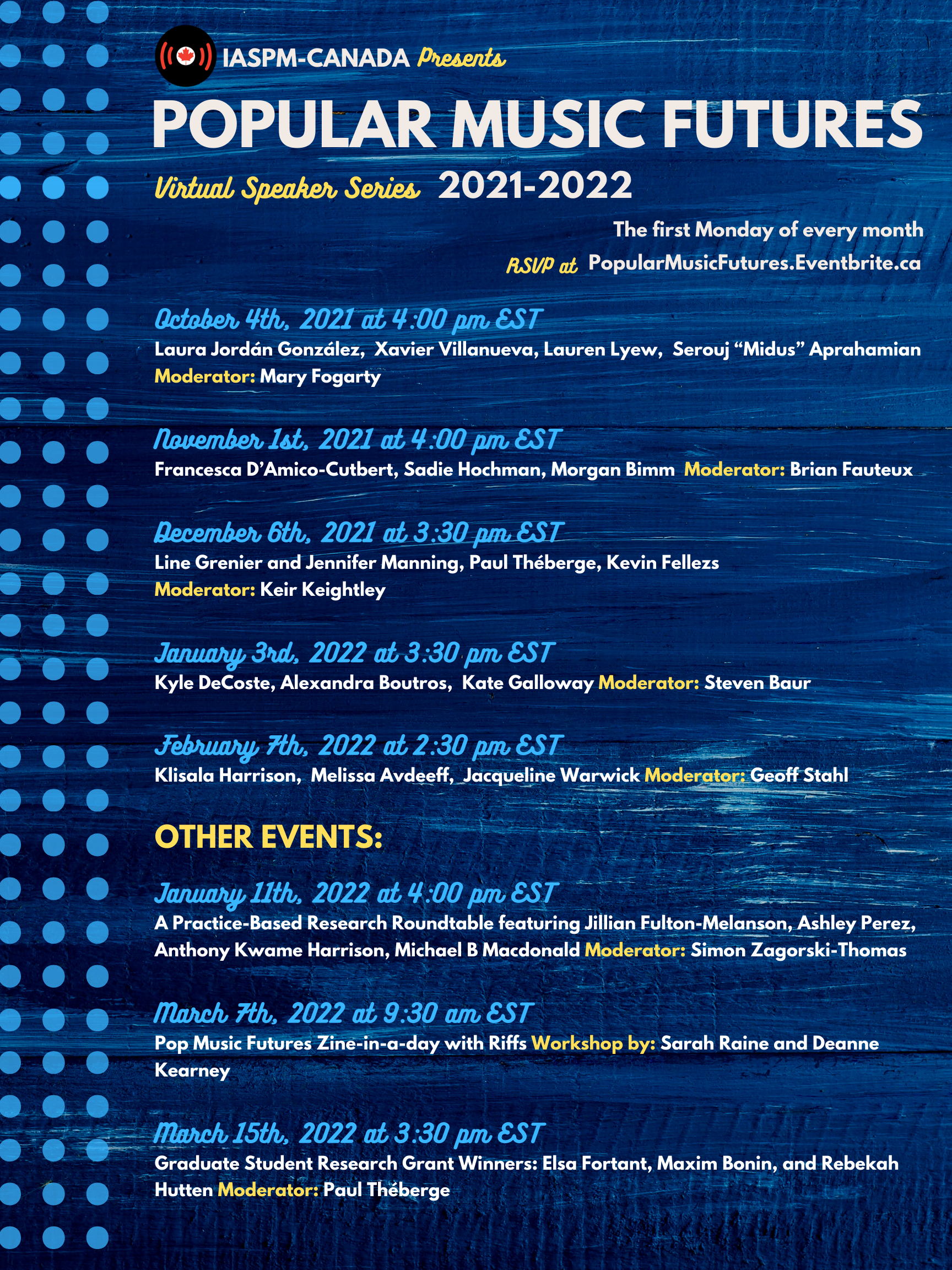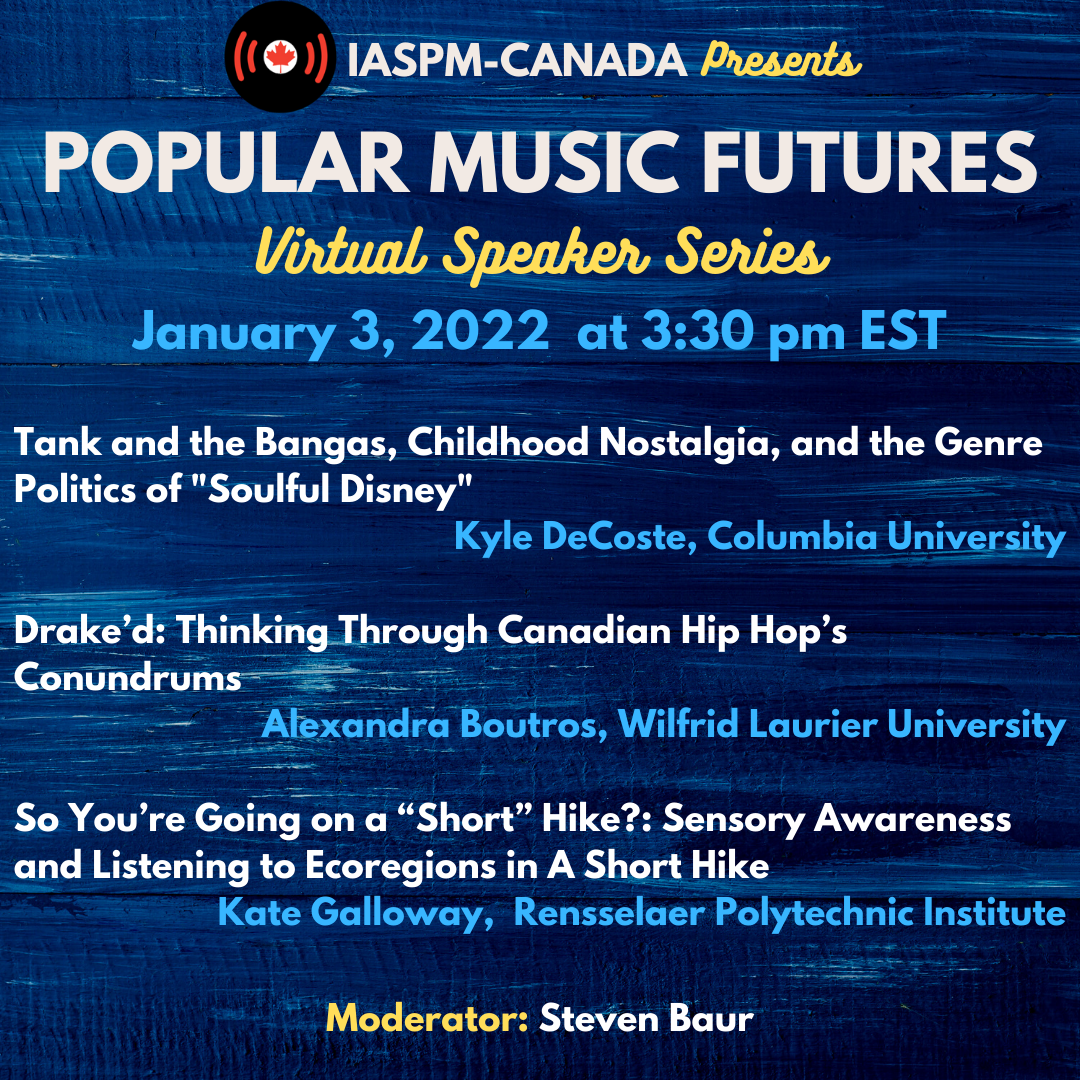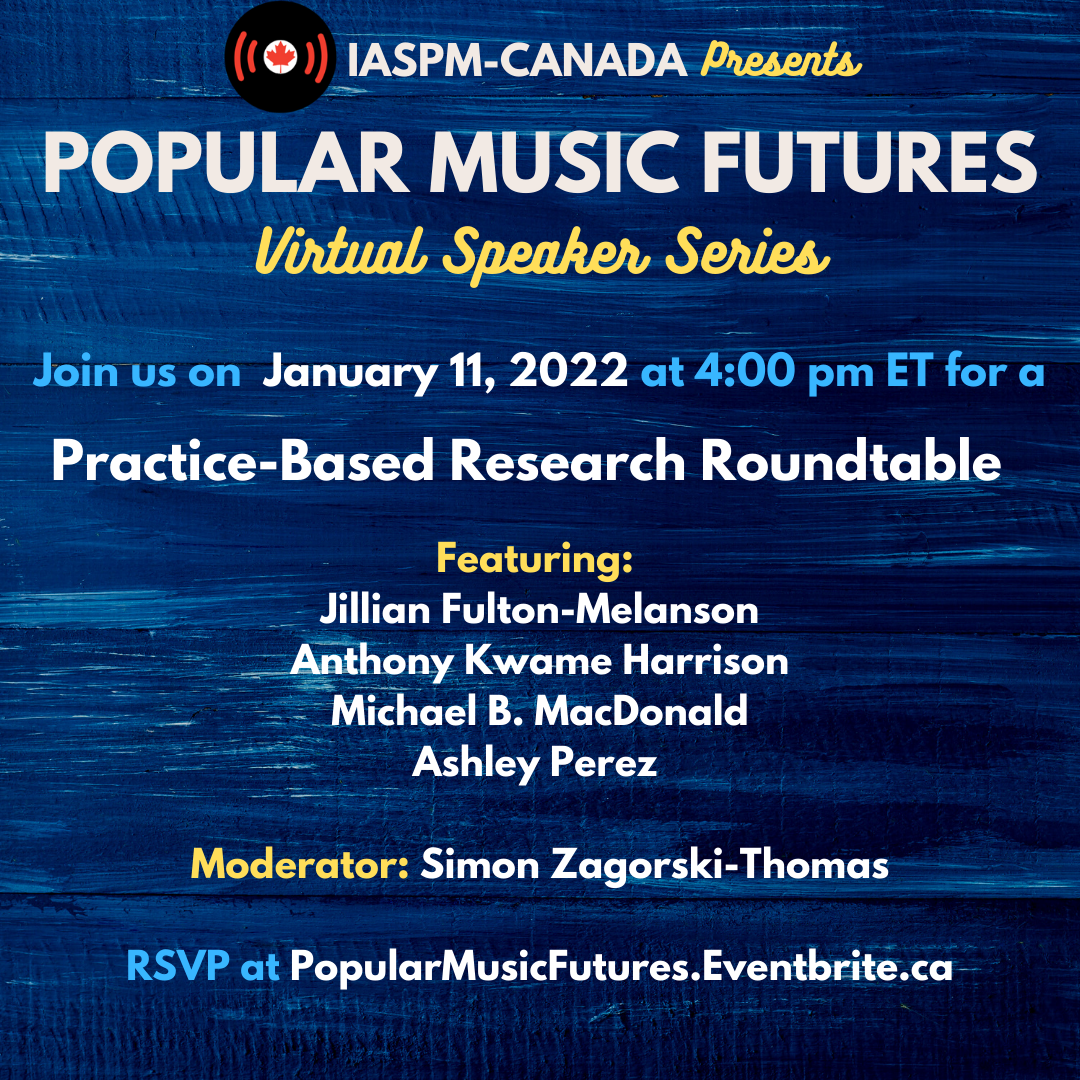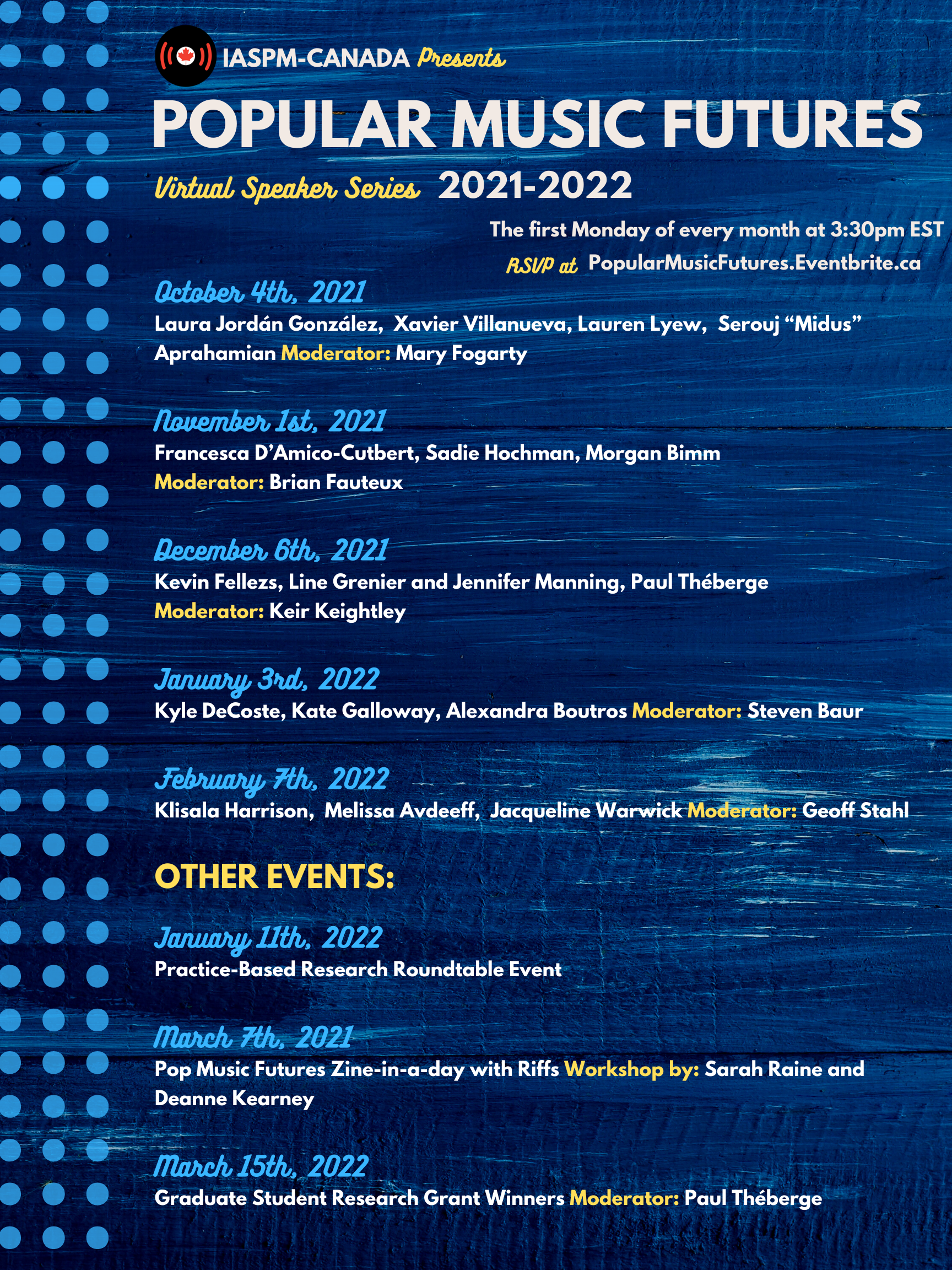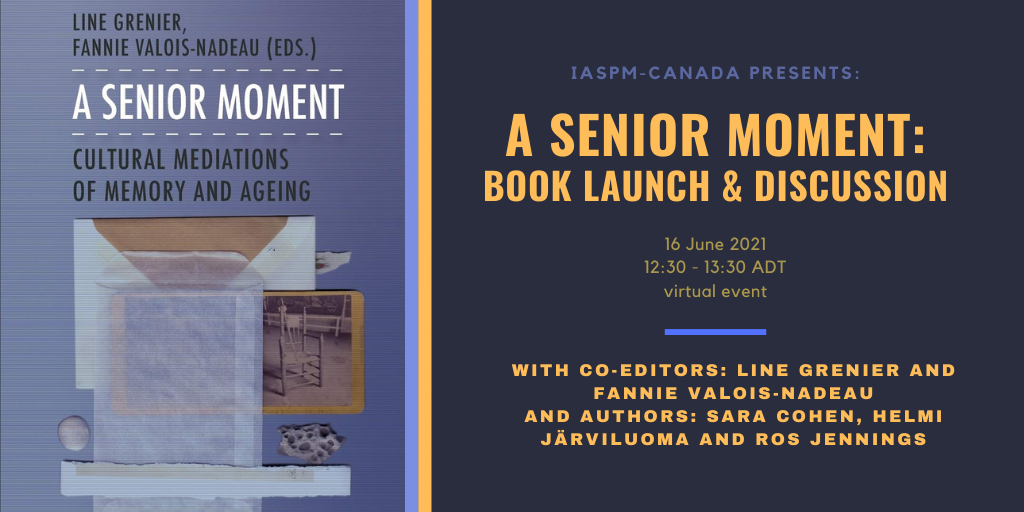Join us 16 June 2021, 12:30 ADT for the launch of Line Grenier and Fannie Valois-Nadeau’s new edited collection, A Senior Moment: Cultural Mediations of Memory and Ageing. Grenier and Valois-Nadeau will be discussing the book and their contributions, alongside contributing authors, Sara Cohen, Helmi Järviluoma, and Ros Jennings.
Register now on Eventbrite.
This talk will be of particular interest to music scholars, as 5 of the 6 chapters are music-related!
More about the book:
Ageing and memory – the interaction of these two aspects of life is something that everybody has to face eventually. The essays in this volume explore the cultural mediations of these categories. Through a series of approaches focused on practices and acts of memory, narrative, reminiscence, representation, and collective memory, they seek to better understand and critically reflect on how ageing is experienced in various ways across the lifespan. By covering a wide range of topics, from biopics, music by the elderly, and artifacts, among other, they all contribute to the understanding of memory as a cultural process always in the making – situated in particular contexts, and shaped by its material conditions of existence.
Purchase your own copy here!
—-
Nous vous invitons à vous joindre à nous pour le lancement du livre A Senior Moment : Cultural Mediations of Memory and Ageing, édité par Line Grenier et Fannie Valois-Nadeau!
Les éditrices seront présentes au lancement pour discuter du livre accompagnées de quelques contributeurs à l’ouvrage : Sara Cohen, Helmi Järviluoma et Ros Jennings.
Cette conférence intéressera particulièrement les chercheurs en musique, car 5 des 6 chapitres sont liés à la musique!
À propos du livre :
Le vieillissement et la mémoire sont deux aspects de la vie auxquels tous devront éventuellement faire face. Les textes compris dans ce volume visent à explorer la médiation culturelle de ces catégories. Faisant usage d’approches centrés entre autres sur des pratiques et actions mémorielles et narratives, ainsi que sur la réminiscence, la représentation et la mémoire collective, les auteurs cherchent à mieux comprendre et illustrer de manière critique comment le processus de vieillissement se vit différemment tout au long de notre existence. Couvrant un grand nombre de sujets, incluant des films biographiques, de la musique chez les personnes âgées ou encore des artéfacts, les auteurs contribuent à l’avancement de la compréhension de la mémoire comme processus culturel en constante évolution se situant au sein de contextes particuliers et définie par ses conditions d’existence matérielles.
Procurez-vous votre copie ici !
Presenter Bios
Sara Cohen is a professor at the University of Liverpool, where she holds the James and Constance Alsop Chair of Music and is director of the Institute of Popular Music. She has a DPhil in social anthropology from Oxford University and is author of Rock Culture in Liverpool: Popular Music in the Making (Oxford University Press, 1991) and Decline, Renewal and the City in Popular Music Culture: Beyond the Beatles (Ashgate, 2007). She is a co-applicant on the Ageing + Communication + Technologies project: Experiencing a Digital World in Later Life (ACT) supported by the Social Sciences and Humanities Research Council of Canada (SSHRC).
Line Grenier is a full professor in the Department of Communication at the Université de Montréal and a popular music studies scholar. For the past few years, she has been conducting research on music and ageing within the framework of the international research partnership ACT (Ageing + Communication + Technologies), for which she is coordinating the Critical Mediations stream. Her current work is devoted to the deaf cultures of ageing and, more specifically, to the musical experiences of deaf adult signers in Montreal.
Helmi Järviluoma is a professor of cultural studies at the University of Eastern Finland and principal investigator of the European Research Council’s project Sensory Transformations and Transgenerational Environmental Relationships in Europe, 1950‒2020. Her areas of expertise include sensory remembering, sensory history and ethnography, qualitative methodology (especially regarding gender), music and social movements. Her publications include the results of a large interdisciplinary follow-up project, Acoustic Environments in Change (co-editor, Tampere University of Applied Sciences, 2009), and Gender and Qualitative Methods (co-author, Sage, 2003/2010). During the past decade she has also made several radio features, combining art and research, for the Finnish Broadcasting Company’s Radio Atelier.
Ros Jennings is co-director of the Research Centre for Women, Ageing and Media (WAM) and head of postgraduate research at the University of Gloucestershire, UK. She is author of “The WAM Manifesto” (2012) and has recently published several articles on older women in relation to popular music, popular television and late style performances. She is co-editor with Abigail Gardner of ‘Rock On’: Women, Ageing and Popular Music (Ashgate, 2012); co-author with Abigail Gardner of Aging and Popular Music in Europe (Routledge, forthcoming); and co-author with Hannah Grist of Carers, Care Homes and the British Media: Caring for Older People (Palgrave Macmillan, forthcoming).
Fannie Valois-Nadeau is a postdoctoral fellow at the Centre de recherches cultures-arts-sociétés (CÉLAT). She is also a lecturer in sociology at Université du Québec en Outaouais (UQO) and a professional researcher who specializes in cultural studies. She holds a PhD in communication, and her research interests intersect popular culture, memory studies, cultural events, sport studies and philanthropy. During the past years, she has conducted research on material and media cultures of memory and temporalities. She is a member of the Culture populaire, connaissance et critique (CPCC) laboratory and a visiting researcher at the Groupe Interdisciplinaire de Recherche sur les Cultures et les Arts en Mouvement (GIRCAM).
---
Sara Cohen est profésseure à l’Université de Liverpool où elle détient la chaire de musique James et Constance Alsop en plus d’être directrice de l’Institute of Popular Music. Elle a un DPhil en anthropology sociale de l’Université d’Oxford et est l’auteure des livres Rock Culture in Liverpool : Popular Music in the Making (Oxford University Press, 1991) et Decline, Renewal and the City in Popular Music Culture : Beyond the Beatles (Ashgate, 2007). Elle est co-candidate pour le projet Ageing + Communication + Technologies project : Experiencing a Digital World in Later Life (ACT) qui est supporté par le conseil de recherche en sciences humaines (CRSH).
Line Grenier est professeure titulaire du département de communication à l’Université de Montréal ainsi que chercheure en musique populaire. Elle entreprend depuis quelques années des recherches sur le vieillissement et la musique selon le cadre du partenariat de recherche international ACT (Ageing + Communication + Technologies), pour lequel elle est coordinatrice du Critical Mediations stream. Elle se consacre dernièrement sur les cultures sourdes du vieillissement, plus précisément sur les expériences musicales chez des chanteurs adultes sourds à Montréal.
Helmi Järviluoma est professeurs d’études culturelles à l’Université de l’Est de la Finlande ainsi que la responsable de recherche pour le projet Sensory Transformations and Trangenerational Environmental Relationships in Europe, 1950-2020 du conseil européen de la recherche. Elle se spécialise en mémoire sensorielle, histoire et ethnographie sensorielle, méthodologie qualitative (particulièrement en ce qui concerne le genre) ainsi que la musique et les mouvements sociaux. Une partie de ses publications font partie d’un grand projet de suivi interdisciplinaire paru en deux ouvrages : Acoustic Environments in Change (co-éditrice, Tampere University of Applied Scinces, 2009) et Gender and Qualitative Methods (coauteure, Sage, 2003/2010). Depuis maintenant près de dix ans, elle mélange art et recherche dans le cadre d’émissions pour la chaine Radio Atelier appartenant à la radio-télévision publique nationale de Finlande (YLE).
Ros Jennings est co-directrice du centre de recherche Women, Ageing and Media (WAM) ainsi que directrice de recherche des étudiants du troisième cycle à l’Université du Gloucestershire en Angleterre. Elle est l’auteure de « The WAM Manifesto » (2012) et a récemment publié plusieurs articles concernant les femmes âgés et leur apport avec la musique populaire, les émissions de télévision populaires ainsi que leurs style de performances. Elle est co-éditrice avec Abigail Gardner de ‘Rock On’ : Women, Ageing and Popular Music ; coauteure avec Abigail Gardner de Aging and Popular Music in Europe (Routledge, à venir) ; et coauteure avec Hannah Grist de Carers, Care Homes and the British Media : Caring for Older People (Palgrave Macmillan, à venir)
Fannie Valois-Nadeau est une chercheure postdoctorale au Centre de recherches Cultures-Arts-Sociétés (CÉLAT). Elle est aussi chargée de cours en sociologie à l’Université du Québec en Outaouais (UQO) et chercheure professionnelle spécialisée en études culturelles. Elle détient un doctorat en communication et ses intérêts de recherche entremêlent la culture populaire, les études sur la mémoire, les événements culturels, le sport et la philanthropie. Elle entreprend depuis quelques années des recherches sur les cultures matérielles et médiatiques de la mémoire et des temporalités. Elle est membre du laboratoire culture populaire, connaissance et critique (CPCC) et elle est chercheure invité au Groupe Interdisciplinaire de Recherche sur les Cultures et les Arts en Mouvement (GIRCAM).



